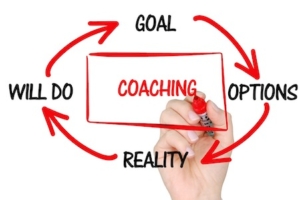Six Ways Executive Coaching Can Improve Your Life
Coaching is often misunderstood. It is not consulting, as the objective of coaching is not teaching or giving advice, but to facilitate your ability to learn about yourself, unlock your own potential, and improve your life.
If you’ve advanced to the upper ranks of your profession, do you even need an executive coach? You got this far, right? Especially at the executive level, having a great coach can dramatically enhance both your leadership and your life. In these times when leading with empathy is a necessary trait, a coach can help you show up to your team with a profound and helpful way to navigate this insanely difficult year as a professional woman in financial services or anywhere.
What can an executive coach do for you? Here are 6 ways that professionally and personally, a coach can help you become the leader and the executive you want to, and need to be.
1. Own Your Leadership Strengths
Own and hone your abilities. Leadership is as learned and acquired as it is somewhat innate. Research regarding female twins explores how developmental experiences and genetics work in tandem to create female leaders. This work, published in the Journal of Applied Psychology, has found that around 30% of factors that lead to women in leadership roles are genetically influenced. This research seems to find that some people are literally born for capacity to lead with executive capabilities inherently there. The other 70% has to do with direct experiences and family influences. Within that a large proportion of success is attributed to securing and occupying a leadership role in the first place or climbing the ladder.
Part of executive coaching is unearthing the natural leader you already are, including identifying your unique strengths and styles. This includes bringing into your awareness the inherent talents that you might not be aware of, or are not valuing enough.
If you are gifted at visioning future opportunities or quality listening or making unexpected connections, you might take that skill for granted. An executive coach can reflect back your unique aptitudes, validate them and help to leverage them more. A coach helps build self-assurance so you can be relaxed in your own skin as a leader.
2. Transition into Leadership Mindset
As you move up, it becomes necessary to re-orient your focus towards your leader role. Coaching will provide valuable “cold, hard truth” about your weaker areas that can be developed.
Part of moving up in an organization is letting go of your comfort zone (how you focused your attention and efforts before your current position).
Putting your head down and doing your own quality work was enough before, but now must evolve to motivating and inspiring others. Coaching can help you to develop a new set of responses and priorities at work.
3. Expand Your Self-Awareness
Executive coaching can help executives focus on self-awareness, so you can see both yourself and others more clearly. A coach helps you to pause and reflect on your unconscious thinking and to question your assumptions and beliefs.
When you dismantle core ways in which you are inhibiting yourself, your perception can widen to transform both your professional and personal life.
Most of us don’t see ourselves clearly, but self-awareness is highly correlated with effectiveness as a leader and with attracting followers. It includes being able to understand how you see yourself and the world, what biases you hold, what beliefs you possess and the impact you might have on others.
With your coach, you examine the way you think and process circumstances and how that creates outcomes. You might consider what thinking process led to a specific action and outcome, and how you could have perceived and responded differently.
You will question core limiting beliefs, often hidden from your conscious awareness, that keep you trapped in emotional cycles, self-sabotage or repeating “safe” behaviors that undermine your potential.
Coaching serves to elevate your emotional intelligence, which becomes more essential the higher you go, and affects your quality of presence, how you respond within a moment and perhaps what kind of skills you need to seek in those around you.
The more emotional intelligence you have, the higher you will go at work.
Research shows that some women have more emotional intelligence than men, if you are one of those women use it. If you are not, and there are many women who do not fit this stereotype, then work with a coach to develop it.
4. Enhance Quality of Relationships
Coaching helps you to gain a more accurate sense of how others perceive you as a leader, which can throw the light on challenge areas to affect better outcomes.
Over 70% of people have shared that coaching improves work performance, relationships and effective communication skills. It helps you to see others more clearly, and to see interpersonal issues between you and others more clearly.
Coaching can help you to examine your limited beliefs about others, especially those who aren’t like you, so you can form productive and rewarding relationships with a more diverse range of people.
5. Improve Focus and Decision-Making
Tony Robbins asks, “Are you majoring in minor things?”
Coaching helps to clarify your core personal and professional values, so you can structure and direct your attention in ways that create real fulfillment. A coach helps you discern between being busy and being effective, so you can better focus your precious energy.
A coach provides valuable external perspective on your strategic thinking and ideas – bringing new angles to consider, pointing out blindspots, giving validation, helping you to articulate your ideas more clearly and step-by-step and helping to navigate execution, even in making bolder moves.
A coach can challenge the assumptions that are limiting your progress. By providing a reflection on patterns or fears that hinder and obstruct your thinking, a coach can help you become more effective at decision-making.
6. Gain A Dedicated Ally
In the feminine version of the heroic journey, there is help along the road. A coach represents an ally that walks the path with you, always in your corner, supporting your development and achievement.
Whether it’s truth-talking on where you’re stuck or advocating for your gifts, a coach will be your confidante and champion in the leadership journey. A coach offers a detached perspective that helps to bring life into clarity, focus and often wider possibility.
As well as helping clarify what you want, outlining how to get there, and then helping navigate the path, your coach becomes your accountability partner along the road to your goals, reminding you of your intentions, where you want to go and why.
With the mental, emotional and strategic inspiration and support of coaching, the leadership road becomes a more personal and expansive journey than you may have ever imagined.
by Aimee Hansen












